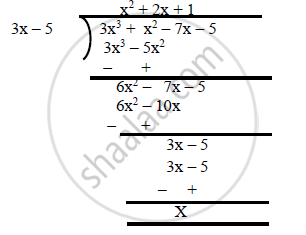Advertisements
Advertisements
प्रश्न
On dividing `3x^3 + x^2 + 2x + 5` is divided by a polynomial g(x), the quotient and remainder are (3x – 5) and (9x + 10) respectively. Find g(x).
उत्तर
By using division rule, we have
Dividend = Quotient × Divisor + Remainder
∴` 3x^3 + x^2 + 2x + 5 = (3x – 5)g(x) + 9x + 10`
⇒`3x^3 + x^2 + 2x + 5 – 9x – 10 = (3x – 5)g(x)`
⇒`3x^3 + x^2 – 7x – 5 = (3x – 5)g(x)`
⇒ `(g(x)=3x^3+x^2-7x-5)/(3x-5)`

`∴g(x) = x^2 + 2x + 1`
APPEARS IN
संबंधित प्रश्न
Find the zeros of the quadratic polynomial 6x2 - 13x + 6 and verify the relation between the zero and its coefficients.
Find the zeros of the quadratic polynomial 9x2 - 5 and verify the relation between the zeros and its coefficients.
Find the zeroes of the following quadratic polynomial and verify the relationship between the zeroes and the coefficients:
x2 – 2x – 8
If 𝛼 and 𝛽 are the zeros of the quadratic polynomial f(t) = t2 − 4t + 3, find the value of `alpha^4beta^3+alpha^3beta^4`
Find a cubic polynomial whose zeroes are `1/2, 1 and -3.`
If 3 and –3 are two zeroes of the polynomial `(x^4 + x^3 – 11x^2 – 9x + 18)`, find all the zeroes of the given polynomial.
An asana is a body posture, originally and still a general term for a sitting meditation pose, and later extended in hatha yoga and modern yoga as exercise, to any type of pose or position, adding reclining, standing, inverted, twisting, and balancing poses. In the figure, one can observe that poses can be related to representation of quadratic polynomial.


The zeroes of the quadratic polynomial `4sqrt3"x"^2 + 5"x" - 2sqrt3` are:
Can the quadratic polynomial x2 + kx + k have equal zeroes for some odd integer k > 1?
For the following, find a quadratic polynomial whose sum and product respectively of the zeroes are as given. Also find the zeroes of these polynomials by factorisation.
`-2sqrt(3), -9`
The zeroes of the quadratic polynomial x2 + 99x + 127 are ______.
